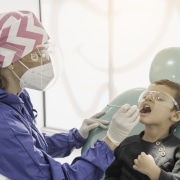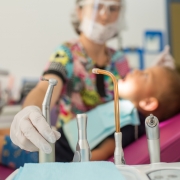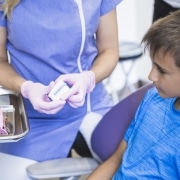Which Foods Are Good for Strengthening My Child’s Teeth?
Since diet and teeth go hand in hand, a child’s oral health is directly affected by the foods and beverages that he or she consumes. Sugary foods and beverages feed the bacteria in the mouth that wreak havoc on the teeth and gums, while acidic foods and beverages weaken tooth enamel. Although, at some point, a child will consume these foods and beverages, in addition to biannual dental cleanings in Bellbrook, OH, parents can use other foods to help strengthen their child’s teeth.
5 Foods That Can Strengthen a Child’s Teeth
One of the best ways parents can help strengthen their child’s teeth is by incorporating foods beneficial to oral health into his or her diet.
1. Firm Raw Vegetables
Eating firm raw vegetables (e.g., celery, carrots) can help remove food debris and reduce the number of bacteria on the teeth. In addition, carrots cause an increase in saliva production, which reduces a child’s risk of developing cavities. Celery provides a substantial amount of the antioxidant vitamins C and A, both of which can improve gum health.
2. Apples
Although apples have a relatively high sugar content, apples also consist of water and fiber. While a child eats an apple, his or her mouth begins producing saliva, which helps rinse away the bacteria responsible for the development of cavities. In addition, the apple’s texture stimulates the child’s gums.
3. Avocados
The flesh of the avocado is loaded with prebiotic fiber, which feeds the probiotic bacteria in the mouth. The probiotic bacteria help oral health by reducing the number of harmful bacteria in the mouth.
4. Chicken Legs, Thighs and Wings
While many people think a skinless chicken breast is the healthiest piece of chicken, when it comes to the teeth, drumsticks, wings and thighs come out on top. These parts of the chicken are most beneficial because they contain high amounts of collagen, which is crucial for gum health. The benefits of collagen can also be obtained by making a stock or bone broth using drumsticks, wings and thighs.
5. Spinach
This vegetable is chock-full of vitamins and minerals that can improve a child’s dental health. Since most children are not in any rush to eat a bowl of Popeye’s favorite food, consider incorporating spinach into a child’s diet by adding it to pasta sauces and smoothies.
While these foods do strengthen the teeth, to ensure good oral health, daily brushing and flossing is still necessary. Furthermore, biannual cleanings remain a vital aspect of maintaining strong, healthy teeth and gums.
If you are looking for an experienced dentist, and you reside in the Bellbrook, Ohio, area, contact Bellbrook Family Dentistry today to schedule an appointment with Dr. John Harmeyer or one of his experienced, caring and dedicated dental professionals. To book an appointment, please call (937) 848-7741 or request an appointment using our online form.
Bellbrook Family Dentistry’s address is 4291 Sugarcreek Drive in Bellbrook, Ohio.










